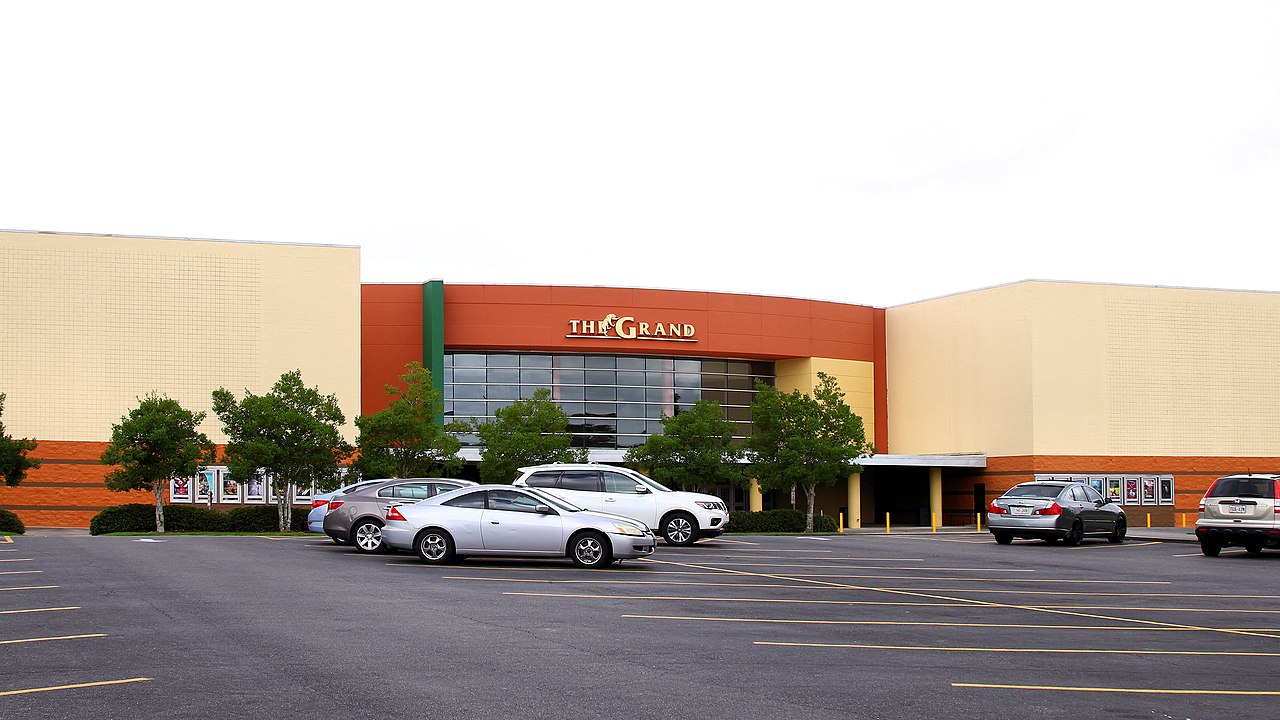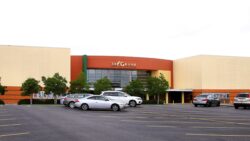Grand 16 Theater Shooting
The Grand 16 Theater Shooting was a 2015 mass shooting in Lafayette that left three dead and injured nine, catapulting the city into a national discussion about gun control.

Larry D. Moore, Wikimedia Commons
The Grand 16 Theater in Lafayette.
Editor’s Note: Warning, this entry contains graphic imagery.
On July 23, 2015, a lone gunman opened fire in the 7:10 p.m. showing of the movie Trainwreck at the Grand 16 Theater in Lafayette, Louisiana, killing three (including the shooter) and injuring nine others. The event left an indelible effect on the Lafayette community while marking a startling uptick in firearms-related violence in public spaces in the US. As a result, Lafayette was placed in the crosshairs of a national discussion about the rise of mass-shooting incidents, firearms regulation, and gendered violence.
“We Thought It Could Never Happen Here”
The scene outside the Grand 16 Theater in Lafayette that late July night looked incredibly familiar to other mass shooting incidents in the US since the 1990s. Yellow caution tape roped off the theater, police lights flashed, and media trucks waited for the latest update from officials. In interviews community members from the recently ranked “Happiest City in America” repeated the frequently used phrase following mass shooting incidents: “We thought it could never happen here.” While mass shootings had occurred throughout the country, Lafayette had never experienced one like this.
According to the US Congress’s Investigative Assistance for Violent Crimes Act of 2012, a “mass shooting” is defined as a firearms incident that results in the death of three or more people in a “place of public use.” Viewed differently from other firearms violence, mass shootings are shocking because they occur in public spaces and with little or no warning of their occurrence. Such was the case for the Columbine High School shooting in 1999 and the 2012 Century 16 Movie Theater shooting in Aurora, Colorado, just two of one-hundred-sixty mass shooting incidents in the US between 2000 and 2013. However, the number of mass shootings was on the rise. In 2015, the year of the Grand 16 Theater Shooting Incident, 372 mass shootings occurred in the US, and Lafayette became part of a list of cities where these events happened.
As details about the shooter were released, residents learned more about what happened in the theater. The gunman, 59-year-old Alabama-native John Russell “Rusty” Houser, drove to Lafayette and stayed at a local Motel 6 before purchasing a late-issued ticket to the 7:10 p.m. screening of the Trainwreck at the Grand 16 Theater, which is located in the center of Lafayette, near the university and downtown areas. At approximately 7:30 p.m., Houser stood up from the second-to-last row of the theater and opened fire on the crowd watching the movie. After firing thirteen rounds, killing two people, and injuring nine others, Houser attempted to escape through the theater’s side door. According to the Daily Advertiser he retreated into the theater upon hearing police sirens, opening fire a second time on moviegoers before turning his gun on himself.
“Lafayette Strong”
At a press briefing shortly after the conclusion of events, Lafayette Police Chief Jim Craft released the names of two victims killed by Houser in the theater: Jillian Johnson, a 33-year-old mother of two from Lafayette, and Mayci Breaux, a 21-year old college student from Franklin. Johnson was well known in the Lafayette community as a businesswoman (owning the Red Arrow Workshop and Parish Ink), a local artist in a band called the Figs, co-founder of the Acadiana Food Circle, and a host on the local radio station KRVS 88.7. Breaux, an aspiring radiology student, was set to start a program at Lafayette General Hospital in the coming days.
In response to the shocking events at the Grand 16 Theater that night, memorials quickly sprang up outside the theater itself, a candlelight vigil was held on the nearby University of Louisiana at Lafayette campus, local churches organized community prayers and services, and a large-scale public memorial event was held in the city’s Cajundome arena. Meanwhile, the United Way of Acadiana helped raise and manage donations of $143,034 for the eleven victims and their families. Throughout the city signs and memorial items appeared featuring “Lafayette Strong,” a slogan representing the grief felt by its residents to this traumatic event. This symbolic phrase was quickly used on everything from social media posts, yard signs, stickers, and t-shirts, with a percentage of any profits going towards victims’ relief funds.
Further discovery of the shooter’s background provided some context for the event. The Lafayette community took only slight comfort in the fact that the gunman was passing through town. It was believed that Houser chose Trainwreck, a film produced and starring comedian and actress Amy Schumer, due to its content that highlighted female-centered comedic humor. Houser had a history of mental illness and domestic violence, and of vocalizing anti-feminist and anti-Semitic views in online social media forums as recently as earlier that year and on a local Georgia talk show in the 1990s. Described by then-Governor Bobby Jindal as “slow and methodical” during the shooting, Houser’s intention was clear: to murder those within the theater that night.
In reaction to the Grand 16 incident Trainwreck-creator Amy Schumer and her cousin, New York senior Senator Chuck Schumer, announced in a joint press conference their intention to push for meaningful change in gun policy. The push included increased funding for the Substance Abuse and Mental Health Services Administration and for greater rewards and penalties based on the submission or lack thereof of background-check records for firearms purchases to the national database. The resulting legislation, introduced in Congress by Senator Schumer, was called the Fix Gun Checks Act of 2016. The argument behind the legislation was that individuals like Houser would have been prevented from purchasing new firearms or enacting violence with firearms they owned after demonstrating mental illness. Amy Schumer further dedicated time in future comedic shows and a chapter in her book—“Mayci and Jillian,” in honor of the deceased victims—to the shooting.
Memorializing the Shooting
Today Lafayette remembers the Grand 16 Theater Shooting victims through two memorials and a community garden known as the “Victory Garden,” a nod to Johnson’s life and work. Additionally, a scholarship fund established in the memory of Mayci Breaux at Lafayette General Hospital is awarded annually to students enrolled in the radiology technology program. Throughout Lafayette the Lafayette Strong signs used to represent community togetherness after the shooting are displayed prominently and have been reused after subsequent disasters as a rallying point for community unity in times of crisis.
